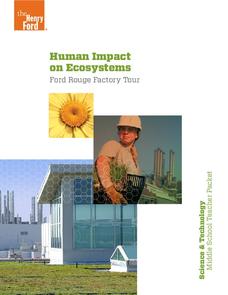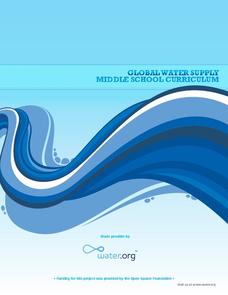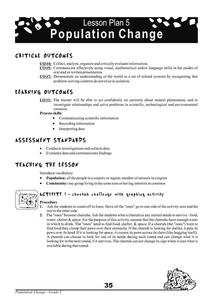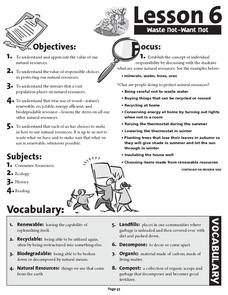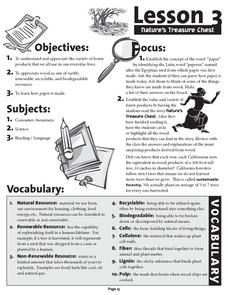NASA
Biology Training Module
Are you a koalafied biologist? The lesson begins with research about human survival and our ecosystem. Then, an online training module simulates the effects of changes to the plants and animals in an ecosystem. Finally, scholars research...
Henry Ford Museum
Human Impact on Ecosystems
An environmenta science unit includes three lessons plus a cumulative project covering the ecosystem. Scholars follow the history of the Ford Rouge Factory from its construction on wetlands and how it destroyed the environment to its...
Chemical Education Foundation
Teacher's Guide to Science Projects
Do you find the idea of having a science fair with all of your learners intimidating? Use a guide that provides everything you need to know to make project-based learning manageable. The resource includes options for four different types...
PricewaterhouseCoopers
Waste and Recycling: Recycling and Energy Recovery
Reduce, reuse, recycle, and recover. Young environmentalists learn about the overwhelming amount of garbage produced and discover better ways to minimize their impact on Earth by learning the difference between garbage and recyclables.
Water
Global Water Supply Middle School Curriculum
We take a steady shower stream and clean drinking water for granted, but in many countries around the world, the lack of water or a clean water supply is responsible for higher sickness and death rates. Taking a closer look at the water...
Community Resources for Science
A Whole New World of DNA and Proteins
Lead your young scientists into an exciting world as they participate in a role play and experiment focused on proteins and DNA. After researching the Central Dogma of Biology, individuals or groups participate in a classroom slide...
Curated OER
Testing for Life’s Molecules
Want to hear a joke about sodium? Na. Young scientists test various materials to identify if they include protein, starch, and glucose by using the Biuret test, iodine starch test, and Benedict's test respectively. After practicing with...
North Carolina State University
Exploring Genetics Across the Middle School Science and Math Curricula
Where is a geneticist's favorite place to swim? A gene pool. Young geneticists complete hands-on activities, experiments, and real-world problem solving throughout the unit. With extra focus on dominant and recessive genes, Punnett...
Curated OER
The Science of Microbes
Looking for an interesting text to share the world of microbes with your middle school classroom? The edition contains explanations, worksheets, experiments, discussions, and links to outside sources for a true and complete microbiology...
Curated OER
Get a Leg Up
Traveling through space is an amazing experience, but it definitely takes a toll on the body. After reading an article and watching a brief video, learners perform an experiment that simulates the effects of zero gravity on the human body.
National Library of Medicine
Electricity, Frankenstein, and the Spark of Life
Shocking! After viewing a short clip from the 1931 movie, Frankenstein and reviewing electricity references in Mary Shelley's novel, class members examine Luigi Galvani's and Alessandro Volta's observations on electricity and muscle...
STEM for Teachers
Tsunami!
How does the depth of an ocean affect the speed of a tsunami's waves? Use Jell-o, graham crackers, and marshmallows to model the effects of an underwater earthquake and its resulting tsunami. The lesson includes hands-on activities,...
North Clackamas Schools
Sorting Living and Nonliving Objects
Is a rock living? How about lima beans? You'll find everything you need for an interactive sorting activity exploring living and non-living things.
Cheetah Outreach
Population Change
Your youngsters become cheetahs in search of food, water, shelter, and space in a fun physical game that does a fantastic job of representing fluctuating species population based on resources available over years.
MOST
What Are Cells?
What's in a cell, anyway? Kids read informational text on what makes up both animal and plant cells, including a page of vocabulary terms they will need to be familiar with (cytoplasm, ribosomes, vacuoles, etc.). Full-color images make...
Forest Foundation
Forests, Carbon & Our Climate
To conclude their examination of forest ecosystems, class members consider the role forests play in the carbon cycle and how forests can offset climate change.
Forest Foundation
Forest Families
Class groups play a Forest Families card game to reinforce concepts presented in the first six sessions of a nine-instructional activity study of tress and forest ecosystems.
Forest Foundation
Waste Not - Want Not
Recycling is the focus in the sixth of a nine-activity series devoted to forest ecosystems. Class members read an article about the responsible use of natural resources and ways to reduce land fill.
Forest Foundation
Forest Health
Young foresters examine the strategies, like prescribed burns and thinning, that are employed to ensure healthy forests.
Forest Foundation
The Sustainable Forest
As part of their examination of forest ecosystems, class members examine how foresters, biologists, botanists, geologists, and hydrologists work to together to develop a management plan for sustainable forests.
Forest Foundation
Nature's Treasure Chest
Renewable, recyclable, and biodegradable. As part of their study of the forest ecosystem, class members read "Nature's Treasure Chest" about the many products made from trees and then craft their own recycled paper.
Forest Foundation
The Nature of Trees
Young botanists examine the different parts of tress and then draw parallels between the functions of these parts and the function of parts of the human body.
Forest Foundation
The Web of Life
Producers, herbivores, carnivores, omnivores, decomposers. To begin a study of the forest ecosystem, learners examine the connections among the members of ecological communities.
TED-Ed
How to Speak Monkey: The Language of Cotton-Top Tamarins
Tamarin monkey language can be categorized by stem upsweep, duration, peak frequency, and frequency change. Although other complex terminology is used to describe the 38 calls of this species, the video is easy to follow and a...



